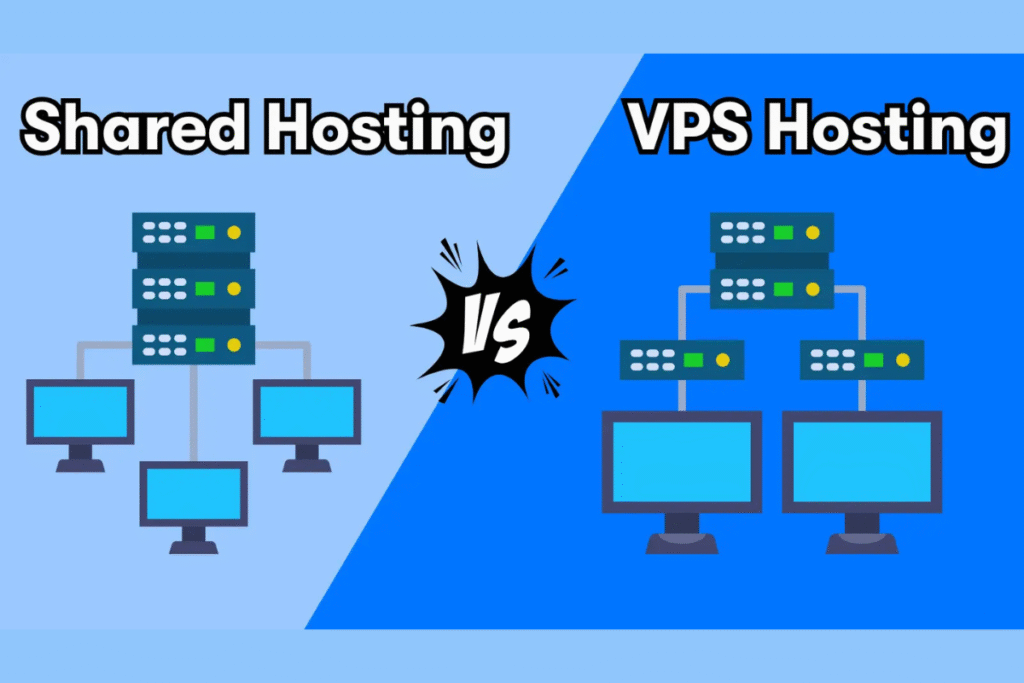When it comes to building a website, one of the most important decisions you’ll make is choosing the right type of web hosting. The hosting you select impacts your website’s speed, security, scalability, and overall performance.
If you’re new to the world of hosting, you’ve likely come across three popular terms: Shared Hosting, VPS Hosting, and Dedicated Hosting. Each of these hosting types comes with its own advantages, drawbacks, and best-use cases. But which one is best for your website?
In this article, we’ll break down these three hosting options in detail, compare their features in a simple table, and help you make the right choice for your online project.
Understanding Shared, VPS, and Dedicated Hosting
Before diving into pros and cons, let’s define each type of hosting in simple terms.
| Hosting Type | What It Means | Best For | Cost Range | Performance | Scalability | Security Level | Example Use Cases |
|---|---|---|---|---|---|---|---|
| Shared Hosting | Multiple websites share the same server resources (CPU, RAM, storage). | Beginners, small websites, blogs | Low ($2 – $10/month) | Basic | Limited | Low | Personal blogs, portfolio sites |
| VPS Hosting | A single physical server is divided into multiple virtual servers with dedicated resources for each user. | Growing websites, small businesses | Medium ($20 – $100/month) | Moderate to High | Good | Medium | E-commerce sites, SaaS, corporate websites |
| Dedicated Hosting | You rent an entire physical server exclusively for your website(s). | Large businesses, high-traffic sites | High ($100 – $500+/month) | Excellent | Very High | High | Enterprise websites, gaming servers, data-intensive apps |
What is Shared Hosting?
Shared hosting is the most affordable type of web hosting, where multiple websites are hosted on a single server. Think of it as renting an apartment with roommates—you share everything, including the kitchen, bathroom, and living space.
- Pros
- Budget-friendly (great for beginners).
- Easy setup with user-friendly control panels like cPanel or Plesk.
- Often includes one-click WordPress installation.
- Cons
- Limited resources (since you’re sharing with others).
- Slower performance during high-traffic periods.
- Security risks if one site on the server gets hacked.
Best for: New bloggers, small personal sites, portfolios, or testing projects.
What is VPS Hosting?
VPS (Virtual Private Server) hosting is a middle ground between shared and dedicated hosting. A physical server is split into several virtual servers, each with dedicated resources.
Imagine it like living in an apartment building, but each apartment has its own bathroom, kitchen, and lock—you still share the building, but you have more control and privacy.
- Pros
- Dedicated resources for better performance.
- Greater customization and control (root access available).
- Scalable—you can upgrade as your site grows.
- Cons
- More expensive than shared hosting.
- Requires some technical knowledge for management.
- Not as powerful as a dedicated server.
Best for: Small to medium businesses, online stores, SaaS applications, and websites expecting moderate traffic.
What is Dedicated Hosting?
Dedicated hosting means you get an entire physical server dedicated to your website. No sharing, no limits—it’s like owning a private villa instead of renting an apartment.
- Pros
- Maximum performance and reliability.
- Complete server customization.
- High-level security (since no other sites are on your server).
- Cons
- High cost.
- Requires technical knowledge or managed services.
- May be overkill for small or medium websites.
Best for: Large enterprises, high-traffic websites, gaming platforms, or organizations handling sensitive data.
Performance Comparison
Performance is one of the most critical aspects of hosting. Here’s how each hosting type compares:
- Shared Hosting: Performance depends on the server load. If one site consumes too many resources, your site may slow down.
- VPS Hosting: Offers stable performance as resources are allocated per user. Good for growing sites.
- Dedicated Hosting: Delivers the best performance possible with no competition for resources.
Cost Breakdown
Price is a big factor when choosing hosting.
- Shared Hosting: Cheapest option, starting from $2–$10/month.
- VPS Hosting: Mid-range, typically $20–$100/month.
- Dedicated Hosting: Premium option, ranging from $100–$500+/month.
Security Considerations
Security needs vary depending on the type of website.
- Shared Hosting: More vulnerable since multiple sites share the same server.
- VPS Hosting: Offers a balance of security and cost-effectiveness.
- Dedicated Hosting: Highest security—ideal for businesses handling customer data or financial transactions.
Which Hosting Should You Choose?
Your choice depends on your website goals, budget, and technical expertise.
- Choose Shared Hosting if:
- You’re starting a small blog, portfolio, or personal site.
- Budget is limited.
- You want easy setup with minimal technical work.
- Choose VPS Hosting if:
- You run a growing business website or online store.
- You need better performance than shared hosting.
- You want more control over your hosting environment.
- Choose Dedicated Hosting if:
- You run a large, high-traffic website or enterprise project.
- You require maximum performance and security.
- Budget is not a concern.
Final Thoughts
Choosing the right hosting type is crucial for your website’s success. Shared hosting is perfect for beginners, VPS hosting balances performance and affordability, and dedicated hosting is best for enterprises that need top-tier performance and security.
Think of it like housing:
- Shared = Renting a room with roommates.
- VPS = Renting your own apartment.
- Dedicated = Owning a private house.
The best choice depends on your project’s needs today and your vision for tomorrow.

